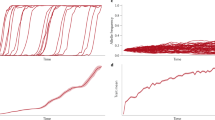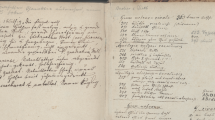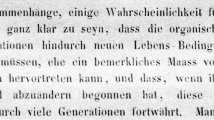Abstract
IN the first place, I will take the opportunity afforded me by Mr. Bather, of correcting a slip in my letter; it is narrowness of carapace that is being, or has been, selected, and not breadth, as I stated. This, however, in no way affects the suggestion. In the next place, I must part company from Mr. Bather on a point of fundamental principle. I decline to accept, as a canon of scientific method, that a zoological (why particularly “zoological”?) hypothesis put forward in explanation of a body of facts still under investigation, and, possibly, leading us on to new principles, should, in order to become plausible, “be proved consonant with some known fact.” I take it that, in making tentative suggestions for the interpretation of results obtained by observation, as in the case under consideration, it is sufficient, if the hypothesis is not opposed by any known fact. I did not lay it down as a dogma that selection must have acted in the way stated. In fact, Prof. Weldon's original interpretation has not yet been, and never may, be disproved, and, for all we know to the contrary, selection may still be acting in the direction indicated by his measurements. Mr. Bather will see, on reference to my letter, that I advanced the idea “for whatever that idea may be worth.” It appears necessary to point out that the “facts” are before us in this case; it is a question of interpretation. The difficulty raised by your correspondent is one of his own creation, and not one of mine. Where have I stated, or even suggested, that the appearance of a character which formerly was of selection value, and which now appears in the later stage of individual development, is a “universal principle”? If the suggestion which I made with reference to the interpretation of Prof. Weldon's results is sound in principle, it is obvious that it refers to a (comparatively) recent cessation of selection, and so far Mr. Bather has correctly grasped my meaning. When, however, he lays it down, on his own responsibility, that the conditions then “can hardly have been very different to now,” he is laying claim to a knowledge of the past and present conditions of life and to a familiarity with the time necessary to bring about the modification of species, at which I can only stand aside with envy and admiration. If Mr. Bather really must have some “known fact” after this distinct dissociation of myself from his methods, I will refer him to those cases of mimetic butterflies which have no models. There is good reason for believing that certain butterflies which are undoubted mimics, since they depart from their allies in type of pattern, have for some unknown reason survived, while the species which they imitated have, also for unknown reasons, become extinct. The mimics still retain their mimetic pattern and colouring, but the selective process which produced this type can no longer (in the absence of the model) be regarded as in active operation. Nevertheless, the mimetic disguise is retained by virtue of heredity, and appears in the last stage of the ontogeny. Your correspondent will, I hope, pardon any apparent discourtesy if I state that the correspondence on this subject is, so far as I am concerned, now closed. I can assure him that he shall hear more about the results of Prof. Weldon's measurements at no very distant future.
This is a preview of subscription content, access via your institution
Access options
Subscribe to this journal
Receive 51 print issues and online access
$199.00 per year
only $3.90 per issue
Buy this article
- Purchase on Springer Link
- Instant access to full article PDF
Prices may be subject to local taxes which are calculated during checkout
Similar content being viewed by others
Rights and permissions
About this article
Cite this article
MELDOLA, R. The Inheritance of Specific Characters. Nature 55, 29–30 (1896). https://doi.org/10.1038/055029c0
Issue Date:
DOI: https://doi.org/10.1038/055029c0
Comments
By submitting a comment you agree to abide by our Terms and Community Guidelines. If you find something abusive or that does not comply with our terms or guidelines please flag it as inappropriate.



